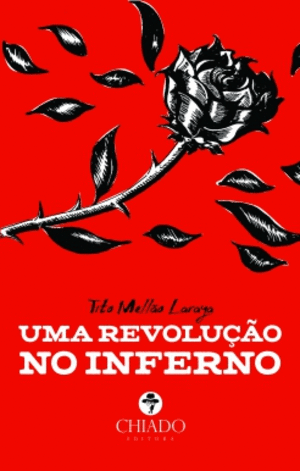Translation - 'A Revolution in the Hell'

This and the translation of the review written by Celso Fernandes Campilongo, on the work of Tito Mellão Laraya - "A Revolution in the Hell"
It is pleasant - but not easy - to review "A Revolution in Hell" by Tito Mellão Laraya (Lisbon, Chiado Editora, 2016). The difficulty is already imposed by the Author's name, with musical sonority and literary syllabary. Onomastic that condenses the artistic personality of Tito: musician and writer. Romance, poetry, essay, fiction, children's story, eroticism and refinement are scattered not only in this book but in Tito's extensive work published in Brazil, Portugal, and Italy.
The style of Tito Mellão Laraya is heterodox: the novelist jumps agilely from prose to poetry and sometimes makes the reader think that texts are lyrics of harmonious songs. Let's be prepared: think before writing and discover new prisms on life that integrate the method of Tito. It aligns itself with writers who "have always bothered" and "think differently".
In this source the Author drinks meditative and original forms.
Tito has a reflective style. He is a writer-philosopher. It combines fantasy and reality with elegance that invites you to think. He approaches the modernist, ironic and irreverent swirl of Oswald de Andrade. It invokes folk myths, biblical stories, fairy tales and social theses, in the style of Monteiro Lobato. It is based on the tradition of essays and literary criticism, such as Antônio Cândido. It has the blunt and sharp delicacy of Lygia Fagundes Telles and Hilda Hilst. Babel? None of this. Past and tradition always with eyes for the future. The old man always new.
Not by chance, Tito studied in the same academic banks, in the same century and in the same School that forged Oswald, Lobato, Cândido, Lygia and Hilda, to stay in century XX. Tito has a literary cradle. No one passes with impunity through the Arcades of Largo de São Francisco. The writing exercise is good for Tito.
Among the passions that the Author reveals, besides the written and beloved women, always wanted to breathe the same airs that Álvares de Azevedo, Fagundes Varela, Vicente de Carvalho and, in a special way, Castro Alves breathed.
In Largo (São Francisco), he was a student of Goffredo da Silva Telles Jr., who was married to Lygia and considered Castro Alves the greatest Brazilian of all time. Yet, as is often the case with enlightened spirits, Tito complains about the School! He believed he would learn to write there. Dream or achievement? Joy or failure? This book and the whole of Tito's work bring the answer. Joseph or Freud may explain the paradox: Tito learned to write in the Largo that always formed writers, but where this craft was never taught.
I guarantee you were a good student! The mystique of the Arcades is relentless.
Tito likes binomials and antinomies. He often resorts to these stylistic forms. Play brilliantly with them: Tito or Joseph, the unity of a difference? It unfolds its narrative in other duals: to be and to want; thinking and feeling; existential and material; critical and hopeful, for example. His writing redefines not the "Book of Jó" or the work of Freud, as he suggests. "A Revolution in Hell" asks about the paradoxical essence of the human being and the aporias that approach and ward off failure and achievement.
His text is tautological: happy because existential and existential because happy. Like Joseph (or Tito?), Who modifies the group while modifying himself! Thus, style is also autologic. Do not think the world outside or above mortals. He thinks of the world and of an unassailable observatory: the world itself. This is where Joseph's hopeful confidence springs.
Tito does not just reveal love of writing. Dichotomically and paradoxically, he feels the "chest hurt" because he is a poet, he confesses. Love and pain at the same time. From pain comes the joy of the text and the passion for literature and life.
Tito affirms that everything oscillates between the yes and the no, the wanting and the despising. I do not believe. The plot of his text, in the reconstruction of Joseph and Freud, reveals much more: the simultaneity of the opposites. The implication and polarity invoked by another of his masters in the Arcades: Reale. The word of a man who thinks differently, has already said about Tito.
Maura Cristina, Larissa, the girls of flowers and the first kiss are maidens who, like in real life, rejoice and distress the poets, all at the same time. Complex and chaotic: for this very reason, beautiful and poetic.
The "Three Little Pigs", Cinderella and "Cinderella" suggest children's adventures. They are re-created stories with the same picardy of the erotic and seductive Vampire described by Tito. On each page, a renewed, provocative and thought-provoking style. A reading that makes you think and uncomfortable, as befits true literature. "Kiss on the neck," Tito would say. Without being a literary critic, and as a duty of office, more trained in legal-academic literature than in artistic literature, I do not hesitate to say: "A Revolution in Hell" is an excellent read!
São Paulo, Christmas 2019
* Celso Fernandes Campilongo is Full Professor and Vice-Director of the USP Law School and Coordinator of the Nucleus of Philosophy of Law of the Post-Graduation Program of PUC-SP. Graduated in Largo de São Francisco in 1980.



.jpg)